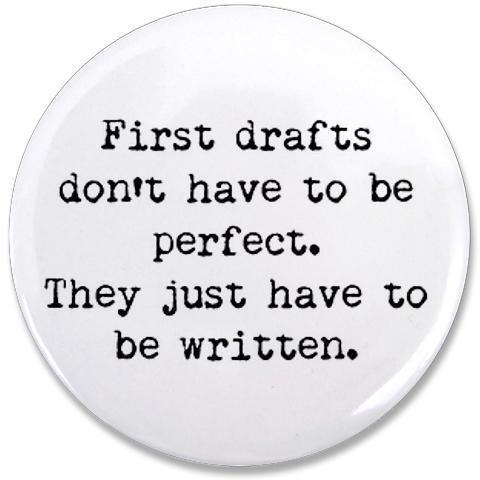Alan Baxter's Blog, page 55
January 31, 2013
Dreaming of Djinn cover revealed
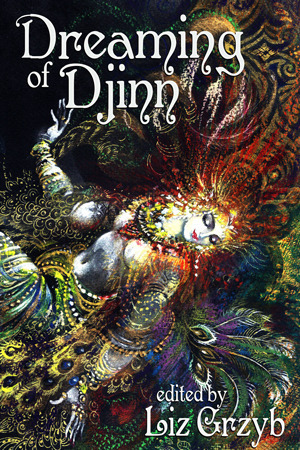 Check out that beautiful cover art, revealed yesterday by Ticonderoga Publications for the new Arabian Nights inspired anthology Dreaming of Djinn, edxited by Liz Grzyb. I am never disappointed with the cover art from Ticonderoga, and they’ve excelled themselves once again. I’m especially pleased as I have a story in this book, due out around April. People are always talking about not judging a book by its cover and, ironically, that applies to pretty much everything except books. It’s right to not judge people by their appearance, for example, or the quality of a home by the building it’s in. But people do, quite rightly, judge books by their covers. That’s what covers are for. They’re the first port of call for a prospective buyer. If the cover looks good, they’ll pick up the book and read the back cover blurb. If that grabs them, they’ll maybe thumb through a page or two. Then they’ll buy the book. If they’re buying on recommendation anyway, the cover is less important, but bad covers still do put people off.
Check out that beautiful cover art, revealed yesterday by Ticonderoga Publications for the new Arabian Nights inspired anthology Dreaming of Djinn, edxited by Liz Grzyb. I am never disappointed with the cover art from Ticonderoga, and they’ve excelled themselves once again. I’m especially pleased as I have a story in this book, due out around April. People are always talking about not judging a book by its cover and, ironically, that applies to pretty much everything except books. It’s right to not judge people by their appearance, for example, or the quality of a home by the building it’s in. But people do, quite rightly, judge books by their covers. That’s what covers are for. They’re the first port of call for a prospective buyer. If the cover looks good, they’ll pick up the book and read the back cover blurb. If that grabs them, they’ll maybe thumb through a page or two. Then they’ll buy the book. If they’re buying on recommendation anyway, the cover is less important, but bad covers still do put people off.
In this day and age of mass production and awful, homogenous graphic art that makes all books look the same, it’s great to see something with some real artistic value and quality design going on. In this case, the artwork is from Ukraine artist, Nadiia Starovoitova, and the design is by Ticonderoga’s own Russell B Farr.
My story in this one is about a young woman with challenges in her life, not least of which being a father who won’t let her grow up. Then she meets someone connected with the Djinn. My story is called On A Crooked Leg Lightly and I’m very proud it was accepted for this book. Look who else is in there:
Marilag Angway “Shadow Dancer”Cherith Baldry “The Green Rose”Alan Baxter “On A Crooked Leg Lightly”Jenny Blackford “The Quiet Realm of the Dark Queen”Jetse de Vries “Djinni Djinni Dream Dream”Thoraiya Dyer “The Saint George Hotel”Joshua Gage “The Dancer of Smoke”Richard Harland “The Tale of the Arrow Girl”Faith Mudge “The Oblivion Box”Havva Murat “Harmony Thicket and the Persian Shoes”Charlotte Nash “Parvaz”Anthony Panegyres “Oleander: An Ottoman Tale”Dan Rabarts “Silver, Sharp as Silk”Angela Rega “The Belly Dancing Crimes of Ms Sahara Desserts”Jenny Schwartz “The Pearl Flower Harvest”Barb Siples “The Sultan’s Debt”Pia Van Ravestein “Street Dancer”DC White “A Dash of Djinn and Tonic”Dreaming of Djinn features 18 incredible tales of romantic Orientalism. The book will be available in April and you can pre-order it here.
.
January 30, 2013
There’s no such thing as a real pantser, or a real planner
I’ve come to the conclusion that there’s no such thing as a pantser when it comes to writing. And I say this as a self-confessed pantser. I’ve stood up and defended the position of writing from the hip against those pesky planners. I’ve defended the greater creative purity of the unplanned writing session. But it’s all bollocks. And you know what? There are no real planners either. This is a bell-curve, so there will be those outliers, but I’ll get to them later.
Firstly, in case you’re the one person who doesn’t know what a pantser or a planner is, let me explain. When it comes to writing fiction, there are two primary camps – people who plan everything and decide on each detail of the plot before they start writing, who are called planners, and people who plan nothing and just let the story all pour out au naturel, called pantsers. These people have also been referred to as architects and gardeners, and in that post I talk about being a bit of one and a bit of the other. But here I intend to make the bolder statement that we’re all a bit of both.
I’ve always identified mostly as a pantser. I don’t like to know everything that’s going to happen in a story before I start to write. What’s the point in writing it then? It’d be like writing it twice – once in note form, then again in detail. But I do make some notes. I have a good idea where things are going and what major events are going to occur in a story. I sometimes don’t know exactly how a book or story is going to end, but I have a good idea where I’m going with it and the ideas I’m playing with. The process of discovery that accompanies the writing then, as my subconscious tells the story through my characters, is the thing I love most about writing. So I do write a lot by the seat of my pants. But I plan too.
It’s the same for planners. Any great writer, no matter how strictly they might plan a book, will gladly let a new idea or an unexpected turn take the story somewhere else. That may mean that they stop and re-plan, based on the unexpected revelation. Or they may just roll with it. The bits and details in between their carefully planned markers will still need filling in, and they will have to cover those transitions and interstices with writing from the hip.
So no pantser never plans, and no planner never pants. Like I said above, it’s a bell-curve. I think it’s more a case of where on the curve you sit. Not whether you’re a pantser or a planner, but to what degree you plan. We’re all plantsers – we all sit down with a story idea and we work on it. We have to. There needs to be some ideas in mind of what we’re writing about, who our characters are (at least in their most superficial incarnation to begin with) and where we’re going with it. That’s planning. But the degree to which we plan that, or how much we leave open, is the only thing that separates our writing styles.
Kim Wilkins is a writer with something like 24 published novels and she is quite vocal about being a very detailed planner. Whenever you raise the subject with her, she will simply cry, “Two million words in print! I rest my case!” and she does kinda have a point. But really, all she’s saying is that she plans a lot, not only a little bit. There’s a case in her argument that everyone should plan a lot. I disagree. I don’t plan in anything like the detail Kim does, but I do plan to a certain extent. We all do. And no matter how much Kim plans, no matter how much of an outlier she is on one side of the bell curve, I bet there’s some pantsing in there too. Just like the person who pretty much pants the whole way will still have a small amount of planning, somewhere in the back of their mind. And even when someone pretty much pants the thing entirely, there comes a point when they need to pull it all together at the end and that requires a bit of planning.
There’s no such thing as a pantser or a planner. There’s just the degree to which we plan.
.
January 24, 2013
Bloodstones contributor copies arrived
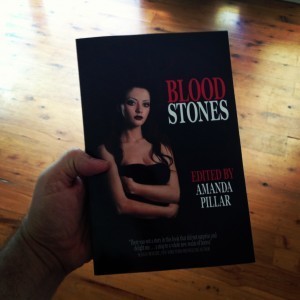 Look at this beautiful tome. It’s the Bloodstones anthology from Ticonderoga Publications, edited by the awesomely talented Amanda Pillar. You can tell she’s awesomely talented because she picked one of my stories to be in this book. And all the others, of course. Bloodstones is an anthology of short fiction using unusual creatures, myths and legends in dark, urban fantasy settings. And let’s be honest, that kind of brief is right up my flagpole. My story is called Cephalopoda Obsessia and it’s my little cephalopod overlord homage. I won’t say any more than that.
Look at this beautiful tome. It’s the Bloodstones anthology from Ticonderoga Publications, edited by the awesomely talented Amanda Pillar. You can tell she’s awesomely talented because she picked one of my stories to be in this book. And all the others, of course. Bloodstones is an anthology of short fiction using unusual creatures, myths and legends in dark, urban fantasy settings. And let’s be honest, that kind of brief is right up my flagpole. My story is called Cephalopoda Obsessia and it’s my little cephalopod overlord homage. I won’t say any more than that.
The book has a great line-up of authors (I’ll post the full list below) and boasts a broad range of subject matter. From the back cover blurb, we’re told we’ll encounter ancient Greek monsters, lamia, gorgons and kraken, as well as the Malay toyol and dukun, Chinese xiannu, Haitian voodoo, ghosts, Cthulhu, selkies and (get this!) the Philippino Alan. That one really has me interested. I mean, I’ll be honest, I have no fucking idea what half the stuff on that list is. But there’s a monster called an Alan? Sign me up!
The forward is by the very talented author, Seanan Maguire, and she says really lovely things about the anthology. Things like, “There was not a story in this book that did not surprise and delight me…” and “…a map to a whole new realm of horror.” Shit, yeah, I like the sound of that. So I can’t wait to get my teeth into this one. You can get your copy from indiebooksonline.com, or all the usual Amazon type places.
Here’s the full list of 17 stories:
Joanne Anderton, “Sanaa’s Army”Alan Baxter, “Cephalopoda Obsessia”Jenny Blackford, “A Moveable Feast”Vivian Caethe, “Skin”MD Curelas, “Smoke Gets In Your Eyes”Thoraiya Dyer, “Surviving Film”Dirk Flinthart, “The Bull in Winter”Stephanie Gunn, “The Skin of the World”Richard Harland, “A Mother’s Love”Pete Kempshall, “Dead Inside”Penny Love, “A Small Bad Thing”Karen Maric, “Embracing the Invisible”Christine Morgan, “Ferreau’s Curse”Nicole Murphy, “Euryale”Kat Otis, “And the Dead Shall be Raised Incorruptible”Dan Rabarts, “The Bone Plate”Erin Underwood, “The Foam Born”.
January 21, 2013
Time for another Top 100
I haven’t done one of these posts for a while, so I thought it was about time. I came across this post of the Top 100 Sci-Fi Books
. Apparently it’s “A statistical survey of the all-time Top 100 sci-fi books”. Whatever that means. There’s a link on the post where you can click to take part in the poll and it takes you to a massive list of SF titles and you’re asked to select ten of them. So by “statistical” I think they mean “voted”. Anyway, it struck me as an interesting list, so I thought I’d see how many of this alleged top 100 books I’ve read. The list is below. Sometimes you’ll see [S1], which means the first book in a series, or [C], which means it’s a single author collection. I’ve bolded all the titles I’ve read. The ones all in italics are books I have, but have yet to get around to reading.
1 Orson Scott Card Ender’s Game [S1] 1985
2 Frank Herbert Dune [S1] 1965
3 Isaac Asimov Foundation [S1-3] 1951
4 Douglas Adams Hitch Hiker’s Guide to the Galaxy [S1] 1979
5 Robert A Heinlein Stranger in a Strange Land 1961
6 George Orwell 1984 1949
7 Ray Bradbury Fahrenheit 451 1954
8 Arthur C Clarke 2001: A Space Odyssey 1968
9 Isaac Asimov [C] I, Robot 1950
10 Philip K Dick Do Androids Dream of Electric Sheep? 1968
11 Robert A Heinlein Starship Troopers 1959
12 William Gibson Neuromancer 1984
13 Larry Niven Ringworld 1970
14 Arthur C Clarke Rendezvous With Rama 1973
15 Dan Simmons Hyperion [S1] 1989
16 H G Wells The Time Machine 1895
17 Aldous Huxley Brave New World 1932
18 Arthur C Clarke Childhood’s End 1954
19 H G Wells The War of the Worlds 1898
20 Joe Haldeman The Forever War 1974
21 Robert A Heinlein The Moon is a Harsh Mistress 1966
22 Ray Bradbury The Martian Chronicles 1950
23 Kurt Vonnegut Slaughterhouse Five 1969
24 Neal Stephenson Snow Crash 1992
25 Niven & Pournelle The Mote in God’s Eye 1975
26 Ursula K Le Guin The Left Hand of Darkness 1969
27 Orson Scott Card Speaker for the Dead [S2] 1986
28 Michael Crichton Jurassic Park 1990
29 Philip K Dick The Man in the High Castle 1962
30 Isaac Asimov The Caves of Steel 1954
31 Jules Verne 20,000 Leagues Under the Sea 1870
32 Alfred Bester The Stars My Destination 1956
33 Roger Zelazny Lord of Light 1967
34 Frederik Pohl Gateway 1977
35 Michael Crichton The Andromeda Strain 1969
36 Madeleine L’Engle A Wrinkle In Time 1962
37 Stanislaw Lem Solaris 1961
38 Kurt Vonnegut Cat’s Cradle 1963
39 Carl Sagan Contact 1985
40 Isaac Asimov The Gods Themselves 1972
41 Philip K Dick Ubik 1969
42 Vernor Vinge A Fire Upon the Deep 1991
43 Anthony Burgess A Clockwork Orange 1962
44 John Wyndham The Day of the Triffids 1951
45 Robert A Heinlein Time Enough For Love 1973
46 Neal Stephenson Cryptonomicon 1999
47 Kim Stanley Robinson Red Mars [S1] 1992
48 Mary Shelley Frankenstein 1818
49 Walter M Miller A Canticle for Leibowitz 1959
50 Daniel Keyes Flowers for Algernon 1966
51 Isaac Asimov The End Of Eternity 1955
52 Jules Verne Journey to the Center of the Earth 1864
53 Iain M Banks Player Of Games [S2] 1988
54 L Ron Hubbard Battlefield Earth 1982 < Seriously!?
55 Peter F Hamilton The Reality Dysfunction [S1] 1996
56 Orson Scott Card Ender’s Shadow [S1] 1999
57 Ursula K Le Guin The Dispossessed 1974
58 Neal Stephenson The Diamond Age 1995
59 Greg Bear Eon 1985
60 Philip Jose Farmer To Your Scattered Bodies Go 1971
61 Kurt Vonnegut The Sirens of Titan 1959
62 David Brin Startide Rising [S2] 1983
63 Philip K Dick A Scanner Darkly 1977
64 Niven & Pournelle Lucifer’s Hammer 1977
65 Margaret Atwood The Handmaid’s Tale 1985
66 Arthur C Clarke The City and the Stars 1956
67 Michael Crichton Sphere 1987
68 Harry Harrison The Stainless Steel Rat [S1] 1961
69 Robert A Heinlein The Door Into Summer 1956
70 Alfred Bester The Demolished Man 1953
71 Gene Wolfe The Fifth Head of Cerberus 1972
72 Alastair Reynolds Revelation Space [S1] 2000
73 H G Wells The Invisible Man 1897
74 Robert A Heinlein Citizen Of the Galaxy 1957
75 Edgar Rice Burroughs A Princess of Mars [S1] 1912
76 Robert A Heinlein The Puppet Masters 1951
77 Dan Simmons Ilium 2003
78 Connie Willis Doomsday Book 1992
79 C S Lewis Out of the Silent Planet [S1] 1938
80 Robert A Heinlein Have Space-Suit – Will Travel 1958
81 Edwin A Abbott Flatland 1884
82 Cormac McCarthy The Road 2006
83 Richard Morgan Altered Carbon [S1] 2002
84 John Scalzi Old Man’s War 2005 < I can honestly say this is one of the worst SF books I've ever read.
85 Philip K Dick The Three Stigmata Of Palmer Eldritch 1964
86 Iain M Banks Use of Weapons [S3] 1990
87 John Wyndham The Chrysalids 1955
88 Ursula K Le Guin The Lathe of Heaven 1971
89 Clifford Simak Way Station 1963
90 Stanislaw Lem [C] The Cyberiad 1974
91 John Brunner Stand on Zanzibar 1969
92 Philip K Dick VALIS 1981
93 David Brin The Postman 1985
94 Robert Louis Stevenson Strange Case Of Dr Jekyll & Mr Hyde 1886
95 Julian May The Many-Colored Land [S1] 1981
96 Arkady & Boris Strugatsky Roadside Picnic 1972
97 Greg Bear The Forge of God 1987
98 Richard Matheson I Am Legend 1954
99 James Blish [C] Cities in Flight 1955
100 Arthur Conan Doyle The Lost World 1912
There are a few on there that I can’t remember for sure if I’ve read or not. I think I might have, many years ago, but it’s equally possible I just thought I should read them but never got around it it. So I’ve left them. The bolded ones I know I’ve read – it’s not a bad showing, though how some of them have made it onto the best 100 list mystifies me. It has also, however, served to remind me of a hell of a lot of books that I haven’t read yet but really want to!
So I’ve read 41 out of that 100. How about you?
.
January 15, 2013
The Importance of Research in Writing
One of the things I like most about writing is the research it leads me to. I think of a story idea and start developing it, then discover I need to know more about something that’s relevant to the story. When I was writing MageSign, for example, I needed to have a good working knowledge of cults and their methods of indoctrination. I could have just made it all up, but it’s important to me to know that I’m getting things right. And I owe it to my readers to deliver something as factually correct and consistent as possible. There’s an authenticity to well-researched fiction. Equally, poorly researched fiction stands out as being pretty rubbish, even if a reader can’t quite put their finger on why. That’s the basis for my Write The Fight Right workshops, after all.
With the cults thing I was lucky in that my mother-in-law is a psychiatrist. She’s been exposed to all kinds of stuff in her line of work and was able to direct me to good quality resources on the subject. I read a lot, educated myself and hopefully wrote an engaging and authentic book that resonated with readers. Along the way, I greatly enjoyed the process, because I learned new things. Education is good, mm-kay.
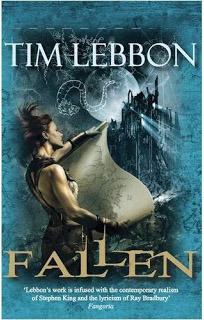 Why am I bringing this up now? Well, I had a really good read partly spoiled by poor research. I’ve just read a novel by Tim Lebbon called Fallen. It’s a great read – a dark fantasy set in the world of Noreela. It’s a bold idea, got great characters, excellent writing and some really cool stuff happens (although I was really disappointed with the ending, which was a shame). I won’t give much away, except to say that the story follows two Voyagers, Ramus and Nomi, and their band of bodyguards. Ramus and Nomi travel and learn for the sake of expanding the knowledge of their nation. To the far south of their land is the Great Divide, a huge wall of rock that stretches from coast to coast and is lost in the clouds above. No one knows how high it is, what’s at the top (if it even has a top) or anything else. So, for reasons explored in interesting ways through the book, Ramus and Nomi set out to climb the Great Divide.
Why am I bringing this up now? Well, I had a really good read partly spoiled by poor research. I’ve just read a novel by Tim Lebbon called Fallen. It’s a great read – a dark fantasy set in the world of Noreela. It’s a bold idea, got great characters, excellent writing and some really cool stuff happens (although I was really disappointed with the ending, which was a shame). I won’t give much away, except to say that the story follows two Voyagers, Ramus and Nomi, and their band of bodyguards. Ramus and Nomi travel and learn for the sake of expanding the knowledge of their nation. To the far south of their land is the Great Divide, a huge wall of rock that stretches from coast to coast and is lost in the clouds above. No one knows how high it is, what’s at the top (if it even has a top) or anything else. So, for reasons explored in interesting ways through the book, Ramus and Nomi set out to climb the Great Divide.
It is a good book and I enjoyed it for the most part. Other than the ending, which I won’t spoil, the other thing that really annoyed me was the climbing research. I don’t know how much experience Tim Lebbon has as a climber. Personally, I’ve only climbed a little bit. It’s a great pastime and one I’d like to do more. However, when I started reading the bit about the climb (which, as you can tell from my brief synopsis above, is a very large and integral part of the book) I had a shock. The characters, as they climbed, kept hammering crampons into the rock face to tie their ropes to for safety. Crampons? I has a confused. This is a crampon:

Crampons are things you strap to your boots to improve traction on snow and ice, especially for ice climbing. You can get walking versions too, for glacier walking and the like. Can you imagine hammering one of those into a rock face and tying a rope to it? You be pretty fucking dead, pretty fucking quick.
These days people use passive safety devices called nuts or hexes for securing their ropes, or more active devices like spring-loaded camming devices. In the old days, they would have just hammered iron spikes into the rock face, I imagine. I don’t know this for certain and would have to research it, but that wouldn’t be hard. Especially with things like Wikipedia and all the hobby forums out there.
Incidentally, even though Lebbon made that mistake, how does something like that get past an editor? Does no-one connected with that book know what a crampon is? Well, I guess that’s a stupid question. Obviously no-one did. And it really spoiled the read for me, because I do know what a crampon is and every time I read about a character hammering one into the rock the narrative became farcical and I ground my teeth and had to try to ignore it and push on regardless.
I’m glad I did because, like I said, it is a good book, ending notwithstanding. Except for the bloody crampon thing. There was another thing I read once, written by an American, where a character passed briefly through England and stopped in a shop. He was charged in Euros. They don’t use Euros in Britain – still the good old pound sterling. It’s a small thing that’s really annoying because it makes the author look dumb and makes the reader question everything else included in the book. If a writer can’t tell the difference between a shoe accessory and a safety device, can I trust him or her on anything else? Unless, of course, I’m really missing something vital and there’s another definition of crampon that I’m not aware of and couldn’t find when I checked.
Even in fantasy and other forms of speculative fiction, it’s really important to get the details right. Internal consistency is essential and building your speculative world in a framework of believable and accurate detail is the only way that suspension of disbelief will survive. We all make mistakes, I’m sure. I bet there are some things in my books that make certain people grind their teeth in frustration. I really hope there aren’t, but I’m not so egotistical to think that I’ve got everything exactly right. But I do try to get things right, I research deeply and the bonus is that I really enjoy that research.
We’re always told to write what we know. Which is a load of bollocks, of course, because we’d run out of things pretty quickly. But we can learn about stuff and then write about it. It’s important that we do, because the process is good fun and it makes us better writers and more informed people. Then we write better books and stories.
Perhaps this whole post is easily summed up thus: When you’re writing, make sure you know the difference between a spiky shoe accessory and an iron spike.
.
January 7, 2013
Wild Chrome by Greg Mellor – review
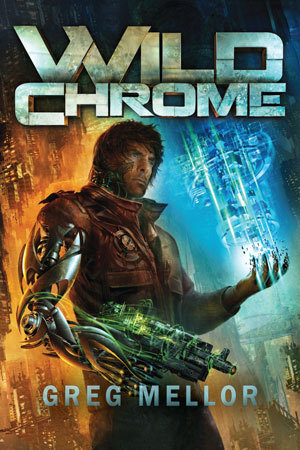 Greg Mellor is a relatively new voice in Australian science fiction, but his debut collection from Ticonderoga Publications places him firmly in the upper echelons of SF writers at work today. Wild Chrome is a collection of 21 short stories, ten of them new and original to the collection and the other eleven reprints from such august publications as Clarkesworld, Cosmos, Aurealis and more.
Greg Mellor is a relatively new voice in Australian science fiction, but his debut collection from Ticonderoga Publications places him firmly in the upper echelons of SF writers at work today. Wild Chrome is a collection of 21 short stories, ten of them new and original to the collection and the other eleven reprints from such august publications as Clarkesworld, Cosmos, Aurealis and more.
Mellor has a background in astrophysics and is one of those writers who can dream big ideas and back them up with believable and potentially realisable science. His stories play mostly around the ideas of the post-human singularity, the arguably inevitable conjoining of humanity and technology, which opens up all kinds of questions about mortality and our place in the universe.
Mellor manages to keep an entirely human aspect in all his work, however big or deep the subject matter. That is, unless it’s one of his stories from the point of view of an alien species, and then he manages to write a very convincing non-human.
Not every story in this book hits the mark dead on, but all the stories are imaginative and entertaining, really nailing the excitement and wonder that we should expect from science fiction. And some of the stories are nothing less than brilliant. I’m looking forward to anything else Greg Mellor writes, but he’s set himself a high bar with this collection.
.
January 6, 2013
Ellen Datlow and ChiZine horror anthology Kickstarter
People, pay attention! There are only three days left to get behind this amazing project and it’s already over 90% funded. Editor extraordinaire, Ellen Datlow, is teaming up with ChiZine Publications to put together an unthemed anthology of short horror fiction called Fearful Symmetries, and the whole thing is happening via Kickstarter.
Three things that make this awesome:
1. Ellen Datlow
2. ChiZine Publications
3. UNTHEMED HORROR!
Seriously, an anthology of unthemed horror put together by Ellen Datlow will be amazing, no question.
As it’s being Kickstartered, there are loads of rewards for various levels of contribution, and some of those rewards are simply fantastic.
Go here now: http://www.kickstarter.com/projects/1...
Get on board, even the smallest donations help. Let’s make sure this thing happens.
.
December 31, 2012
“Tiny Lives” at Daily Science Fiction
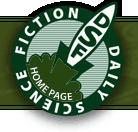 My short story, Tiny Lives, is online now at Daily Science Fiction. I’m really pleased to be published there, and not only because they pay very well. I’ve been a Daily SF subscriber for ages and they really do publish some excellent SF and fantasy fiction. My story is a bittersweet piece of modern fantasy.
My short story, Tiny Lives, is online now at Daily Science Fiction. I’m really pleased to be published there, and not only because they pay very well. I’ve been a Daily SF subscriber for ages and they really do publish some excellent SF and fantasy fiction. My story is a bittersweet piece of modern fantasy.
You can find the story here – I hope you enjoy it. Leave it a Rocket Dragon rating at the end if you feel like it too.
.
December 30, 2012
New year’s resolutions be damned, these things I will ALWAYS do
I don’t really believe in new year’s resolutions. I get the concept, and it’s an entirely admirable pursuit, but it’s often like crash dieting or NaNoWriMo – it’s fundamentally unsustainable. People make all these promises to themselves in the heat and excitement of a new year, and then sink in guilt and stress when those things may not come to pass.
After all, January 1st is only one day after December 31st and it’s entirely arbitrary that we choose to tack onto that day a new identifier for the year. The Chinese aren’t celebrating their new year until February 10th next year, for example. It’s all bollocks, as is all time. As Terry Pratchett said, we just invented time to stop everything happening at once. Which is funny, but also not true. Time is a purely human invention to help us make sense of things and organise when to meet at the pub.
My simple point is this – making specific resolutions for the new year is a fine sentiment, but it’s often very hard to follow through. For example, saying, “I will lose 20kg in 2013″ is potentially opening a person up to failure. But if you say, “I will be a healthier person in 2013: eat healthy, exercise and try to lose some weight”, then that’s more of an attitude than a particular goal and easier to hang onto for a longer period of time. It’s easy to look at that sentiment throughout the year and try to stick to it, as there’s no specific measurement involved that might slip away. And if you fall back from that attitude for a while, it’s pretty easy to look at it, remind yourself and get back on that horse to ride again. Giddy up, motherfucker, there’s no point in crying when you could be trying.
So instead of making new year’s resolutions, I’m going to list a bunch of things I intend to hang onto all year. Not resolutions, but attitudes to never forget. These are ways of being that I’ve always tried to maintain, and intend to maintain into the future.
So, in 2013 (and beyond):
I will continue to work hard at being the best writer I can be, because this shit isn’t easy, nor should it be.
I will finish all the things I start.
I will continue to pursue publication in all the places I’ve yet to crack and further publications in the places I’ve already been featured.
I will have more work published.
I will write novels, novellas and short fiction, because stories are great in all sizes.
I will grab every opportunity that comes my way, because I am a fucking professional and time is made, not found.
I will celebrate the successes of all other writers, because their success is proof I can succeed too. And they deserve it.
I will share the good shit and ignore the rubbish.
I will help my writer friends wherever I can, because I didn’t get where I am now without help.
I will strive to excel and improve, because where I am now is nowhere near where I want to be. I want the moon and the fucking stars, baby.
I will continue to read like a voracious word devourer, because a writer who doesn’t read is a crappy writer. And a bad person. A really, really bad person.
I will look after my health.
I WILL WRITE, because the only actual requirement to be a writer is that you write. Being published, being famous, being rich and successful, being happy with your creative endeavours, none of it comes unless you write. First and foremost before everything else: WRITE. You will not find the time to write – you MAKE the time to write. If you really want it, you will make it happen. Only got one hour, twice a week? Fine, start there. Write for two hours a week, every week. Guess what? You’re a writer now. Then make more time. Make. It. Happen. Then all that other stuff can follow.
These are only my writerly attitudes, of course. Similar philosophies apply to my life as a martial artist, instructor and personal trainer, and to my life in general as a human person of Earth. It’s good to focus on these things and remind ourselves of them regularly. New year is a fine time to take stock, but so is every other day of the year. These things are not resolutions. These things are constants.
May 2013 be everything you want it to be. I wish you all (and myself) happiness, health and success in all you do. Now get out there and make it happen, motherhumpers. I want to hear your names sung from the mountaintops, and mine sung along with them.
.

